Advancing local capacities for livestock breeding practice and research in Burkina Faso | LoCaBreed2.0

Project Coordinator: Gábor Mészáros
Coordinating Institution: University of Natural Resources and Life Sciences, Vienna
Partner Institutions: University of Veterinary Medicine Vienna (Pamela Burger); Norbert Zongo University, Koudougou (Albert Soudré); Nazi Boni University, Bobo Dioulasso (Salifou Ouedraogo); Environmental Institute for Agricultural Research (Amadou Traoré); African Institute for Economics and Social Development - Inades-Formation Burkina (Isidore Della); National Center for Animal Genetics Improvement (Innocent Wenceslas Tapsoba)
Partner Countries: Burkina Faso
Project Duration: 1 October 2022 – 30 September 2025 (36 months)
Budget: EUR 389.999,57
Project Overview
Healthy and well-managed livestock is essential for the economic and social development in Burkina Faso and has been identified as a strategic sub-sector in the fight against poverty allowing sustainable rural development. LoCaBreed, the Academic Partnership of five Burkinabe and Austrian institutions, has successfully worked in this sub-sector implementing community based breeding programs (CBBP) with farmers in the South-West of Burkina Faso, supporting their transition from cattle keepers to breeders, including formation of a Lobi cattle breeders association.
LoCaBreed2.0 builds on that foundation, by expanding gender, youth and ethnicity sensitive CBBP to additional communities to generate genetic progress, but more so by cooperating with governmental institutions in developing a national recording and breeding strategy for ruminant livestock populations and prompting support of non-governmental organizations for developing and implementing CBBP for cattle and small ruminants, particularly goats.
New digital tools for mobile recording using cloud based data management making records available for routine selection of best animals in each community as well as marketing of breeding stock are the backbone of breeding operations. Based on suggestions of the National Coordinator of LoCaBreed, the Ministry of Livestock and Fisheries Resources has decided to establish several bull stations for mating cows with best local bulls across the country, one of them in the area of operation of LoCaBreed2.0. The project help developing best operational practice for this mating center.
Goat CBBP are being established in participating cattle CBBP communities to especially benefit women, traditional owners and keepers of goats and opening a range of research questions related to breeding objectives and modes of breeding operation. Specific attention is given to the participation of women, youth and dimensions of ethnic diversity in LoCaBreed2.0, continuing and expanding LoCaBreed efforts to involve women in cattle CBBP, which had comparatively little success, mostly due to local traditional gender norms. Value chain analysis, with special focus on women’s participation and marketing strategies are conducted.
Migrant Fulani people have come to the region bringing their own types of cattle and goats, which are generally more productive but more susceptible to trypanosomosis, an animal disease equivalent to human sleeping sickness, because they originate from areas without the pressure of this disease. With regard to basic research related to genetics and genomics, diversity studies of local cattle and goat populations are performed and genetic variants conferring resistance/tolerance to trypanosomosis searched for. For this, tests of trypanosome infection are performed for large numbers of cattle and goats and these animals are genotyped for ~50,000 genetic markers each. If found, such markers will be added to a low density genetic marker panel already established by LoCaBreed to test for breed purity. Finally LoCaBreed2.0 reviews and develops educational resources to strengthen and further develop Master curricula related to animal breeding and genetics for Burkina Faso. The LoCaBreed2.0 team includes several PhD students as well as recent LoCaBreed PhD graduates, promoting animal breeding research capacities for development in Burkina Faso and Austria.
Through achieving these outcomes LoCaBreed2.0 contributes to achieving the overall objectives of the APPEAR program by (i) contributing to the eradication of rural poverty through increasing the production and marketing potential of local cattle and goat breeding systems, (ii) enhancing gender equality and women’s empowerment, (iii) leveraging digital breeding technologies for rural areas and (iv) strengthening local capacities for higher education and research.
Reporting

Advancing local capacities for livestock breeding | LoCaBreed | Report 1st project year
The LoCaBreed2.0 project, launched in October 2022, is making strides in strengthening local capacities for livestock breeding in Burkina Faso through collaborative efforts and community engagement. Highlights so far include a dynamic kick-off meeting in Bobo-Dioulasso.



